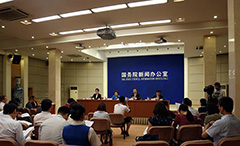Red tape reduced to grant firms easier market access
2018-09-22
China Daily
China’s top market regulator is to cancel or relax 106 items that need government approval when businesses apply for operating permits, as part of reforms to reduce red tape and create a better environment for enterprises.
The changes will take effect on Nov 10, Ma Zhengqi, deputy head of the State Administration for Market Regulation, said at a policy briefing hosted by the State Council Information Office on Sept 21.
Among the 106 items, two will be canceled outright, meaning some market entities will be able to start operation as soon as they receive business licenses, he said. Previously, enterprises needed various permits depending on their industry before being allowed to trade.
One item will be also reclassified as “file submission,” meaning enterprises can operate as long as they have handed over the necessary paperwork to regulators, Ma said.
For another 18 items, market entities will receive immediate on-site approval after they make written promises and submit the necessary materials, while the other 84 items will be streamlined to increase efficiency, he said.
The briefing followed the release of a guideline about the reform approved at an executive meeting of the State Council on Sept 12. The meeting decided to roll out nationwide a pilot program in the Shanghai free trade zone that separated business licenses from operating permits.
Ma said China has adopted a series of reforms to improve its business environment and reduce institutional costs for enterprises. As of last month, China had 105 million market entities, including more than 32 million enterprises, according to the administration’s data.
The country has risen 65 places in the global ranking for ease of market access for new enterprises, he said. Although, he added, enterprises can still face a long process before starting operations in China.
A number of measures will help promote the reform, Ma said, such as random inspections, which is when the enterprise and inspection officials are randomly selected by computer. This method will ease the burden on enterprises but keep them alert, he said.
Meanwhile, the National Enterprise Credit Publicity System now covers more than 30 million enterprises nationwide, showing their records in areas such as business registration and government penalties. Ma said no one would want to see their poor records exposed in the system.
Zhao Zhenhua, director of government legislation coordination for the Ministry of Justice, said some legislative clauses would be amended concerning the reform before November.


